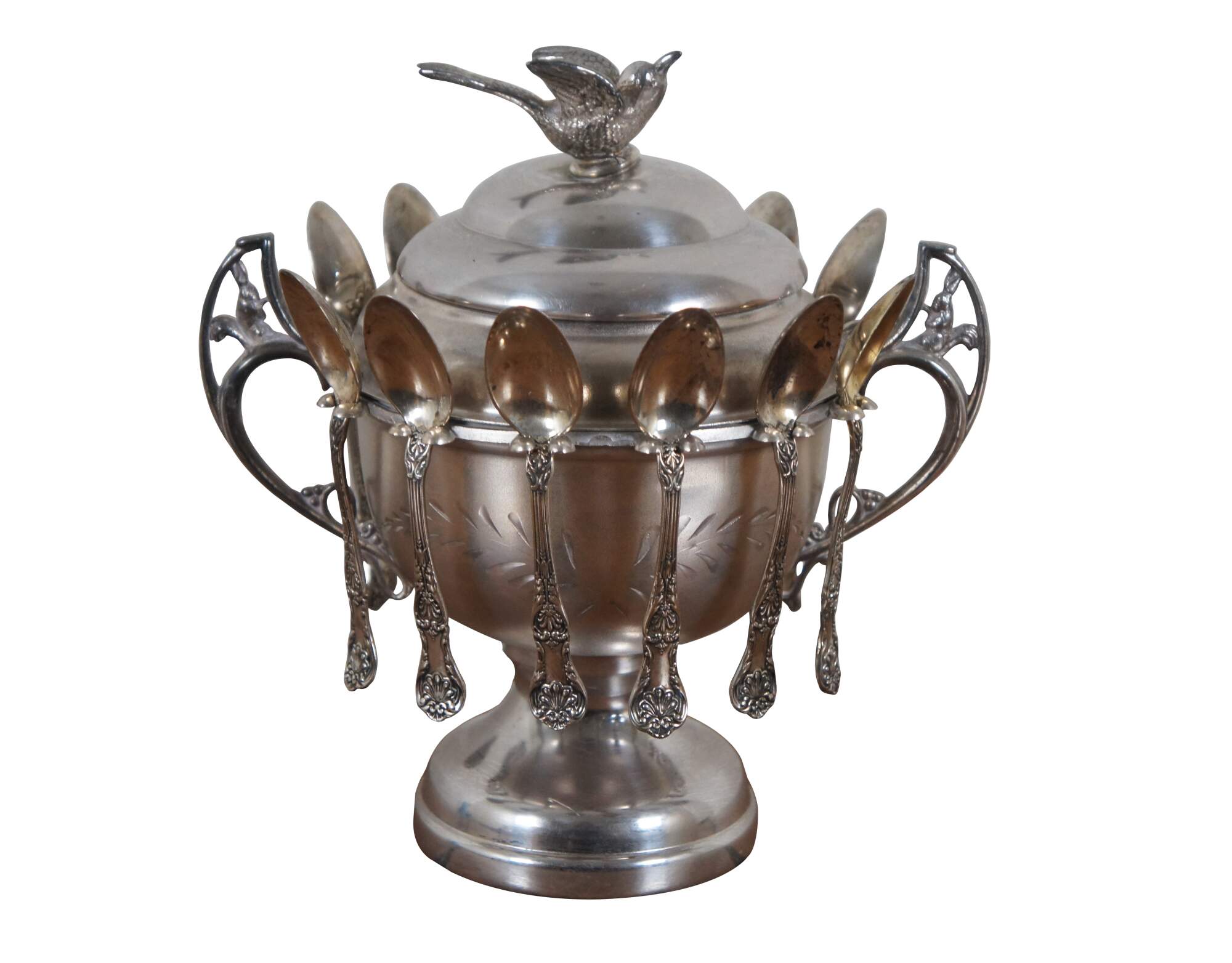
Shipping:
Free Shipping Included
Delivery:
Estimated 2-15 Business Days
Payments:
Credit Card, Check, Cash, PayPal, Apple Pay, Venmo
Returns:
30 Days 100% Money Back Guarantee, Buyer Pays Return Shipping
Description
Antique turn of the century 13 piece Caviar Server, Souffle and hanging spoon set, featuring a trophy urn style bowl with etched palm leaves on the body, brackets to support twelve sugar spoons, squirrels in the pieced handles and a sparrow shaped finial. Set includes 11 Gorham sterling silver demitasse spoons in the New Queens pattern (introduced 1895); sold by J.E. Caldwell & Co. Bowl and lid by William Rogers (cross and keystone mark, circa 1900-1910), design number 57.
"Gorham Silver was founded in Providence, Rhode Island, in 1831 by Jabez Gorham, a master craftsman, in partnership with Henry L. Webster. The firm's chief product was spoons of coin silver, but also made thimbles, combs, jewelry, and other small items. In 1865, the Rhode Island legislature granted a charter in the name of Gorham Manufacturing Company. During the heyday of American silver manufacturing, approximately 1850–1940, Gorham was highly influential. The company has produced matching hollowware in both sterling and silverplate, as well as running a foundry for bronze sculpture. The White House has used Gorham silver services during many administrations including those of Lincoln, Grant, and George W. Bush. Gorham artisans also sculpted several famous statues housed in the Capitol's Rotunda, overlooking the Museum of Natural History in New York, and topping the Rhode Island State House. Gorham has also designed a number of elaborate trophies for sporting events, including the Borg-Warner Trophy for the Indianapolis 500, designed by Robert J. Hill. The company has changed hands multiple times beginning with Textron (1967), to Dansk International Designs (1989), to Brown-Forman Corporation (1991), to the Lenox Group (2005), to Clarion Capital Partners (2009), now operating under the name Lenox Corporation."
"William Hazen Rogers (born May 13, 1801) was an American master silversmith and a pioneer in the silver-plate industry and whose work and name have survived to the present day. Rogers partnered with other silversmiths at times, and his company and trademarks were eventually taken over by larger companies. Rogers was born on a farm on May 13, 1801, to Sarah Reynolds (1777-?) and Asa Rogers (1798-1824). After he left home, he went on to become a silversmith, watchmaker and jeweler. From 1820 to 1825, Rogers was an apprentice to Joseph Church, a silversmith and watchmaker in Hartford. In 1825, Rogers became partners with Church and their company, Church & Rogers, initially manufactured silver-plate flatware and hollowware. He was also partner, from 1832 to 1838, with Asa Harris Rogers, his younger brother, as "A Rogers Jr. & Co." while still associated with Church & Rogers. Rogers – together with his two brothers and, later, his son – was responsible for more than 100 patterns of silver and silver-plated cutlery and serving dishes. Many of Roger's designs were influenced by Louis XIV-style patterns of the 17th and 18th century in France, and he was best known for his Elberon pattern and "Presidential" cutlery series. The companies in which one or more of the original Rogers brothers (William, Asa and Simeon) were actively interested and the dates they were organized are as follows: Rogers Brothers, Hartford, in 1847; Rogers, Smith & Co., Hartford, in 1856; Rogers & Brother, Waterbury, in 1858; William Rogers Mfg. Co. (Wm. Rogers & Son), Hartford, in 1865; Rogers Cutlery Co., Hartford, in 1871. These concerns, as well as the Meriden Britannia Co. (beginning in 1862) continued the production of "1847 Rogers Bros" and at various times have been part of the lnternational Silver Co. All three of the partners, William, Asa and Simeon, were in the employ of the Meriden Britannia Co. when they died.
Condition
Good Overall - Some spots/tarnish; dent to finial
Dimensions
7.75" x 5.75" x 7.75" / Spoon - 4.25" x 0.75" (Width x Depth x Height) / Combined Spoon Weight - 166.2 g